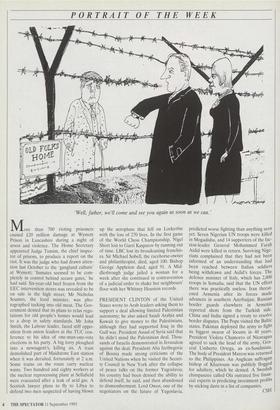PORTRAIT OF THE WEEK
'Well, father, we'll come and see you again as soon as we can.'
More than 700 rioting prisoners caused £20 million damage at Wymott Prison in Lancashire during a night of arson and violence. The Home Secretary appointed Judge Tumim, the chief inspec- tor of prisons, to produce a report on the riot. It was the judge who had drawn atten- tion last October to the 'gangland culture' at Wymott; 'Inmates seemed to be com- pletely in control behind secure gates,' he had said. Six-year-old beef frozen from the EEC intervention stores was revealed to be on sale in the high street; Mr Nicholas Soames, the food minister, was pho- tographed tucking into old meat. The Gov- ernment denied that its plans to relax regu- lations for old people's homes would lead to a drop in safety standards. Mr John Smith, the Labour leader, faced stiff oppo- sition from union leaders at the TUC con- ference to his idea of one-man-one-vote elections in his party. A big lorry ploughed into a newsagent's, killing six. A train demolished part of Maidstone East station when it was derailed, fortunately at 2 a.m. Some trains on the route carry nuclear waste. Two hundred and eighty workers at the nuclear reprocessing plant at Sellafield were evacuated after a leak of acid gas. A Scottish lawyer plans to fly to Libya to defend two men suspected of having blown
up the aeroplane that fell on Lockerbie with the loss of 270 lives. In the first game of the World Chess Championship, Nigel Short lost to Garri Kasparov by running out of time. LBC lost its broadcasting franchis- es. Sir Michael Sobell, the racehorse-owner and philanthropist, died, aged 100. Bishop George Appleton died, aged 91. A Mid- dlesbrough judge jailed a woman for a week after she continued in contravention of a judicial order to shake her neighbours' floor with her Whitney Houston records.
PRESIDENT CLINTON of the United States wrote to Arab leaders asking them to support a deal allowing limited Palestinian autonomy; he also asked Saudi AraIlia and Kuwait to give money to the Palestinians, although they had supported Iraq in the Gulf war. President Assad of Syria said that he didn't mind the Palestinian deal. Thou- sands of Israelis demonstrated in Jerusalem against the deal. President Alia Izetbegovic of Bosnia made strong criticisms of the United Nations when he visited the Securi- ty Council in New York after the collapse of peace talks on the former Yugoslavia; his country had been denied the ability to defend itself, he said, and then abandoned to dismemberment. Lord Owen, one of the negotiators on the future of Yugoslavia,
predicted worse fighting than anything seen yet. Seven Nigerian UN troops were killed in Mogadishu, and 14 supporters of the fac- tion-leader General Mohammed Farah Aidid were killed in return. Surviving Nige- rians complained that they had not been informed of an understanding that had been reached between Italian soldiers being withdrawn and Aidid's forces. The defence minister of Italy, which has 2,800 troops in Somalia, said that the UN effort there was practically useless. Iran threat- ened Armenia after its forces made advances in southern Azerbaijan; Russian border guards elsewhere in Armenia reported shots from the Turkish side. China and India signed a treaty to resolve border disputes. The Pope visited the Baltic states. Pakistan deployed the army to fight its biggest swarm of locusts in 40 years. President Violeta Chamorro of Nicaragua agreed to sack the head of the army, Gen- eral Umberto Ortega, an ex-Sandinista. The body of President Marcos was returned to the Philippines. An Anglican suffragan bishop of Khartoum was publicly flogged for adultery, which he denied. A Swedish chimpanzee called Ola outrated five finan- cial experts in predicting investment profits by sticking darts in a list of companies.
CSH


















































 Previous page
Previous page